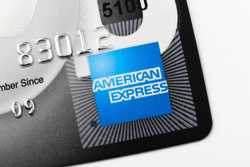How to Pay Off Credit Card Debt Fast: 8 Expert Tips

Our evaluations and opinions are not influenced by our advertising relationships, but we may earn a commission from our partners’ links. This content is created by TIME Stamped, under TIME’s direction and produced in accordance with TIME’s editorial guidelines and overseen by TIME’s editorial staff. Learn more about it.
If you’re like many consumers, you consider credit card debt a necessary evil. Credit cards are convenient and can quickly cover emergency purchases, help you shop safely online, and allow you to easily rent cars or reserve hotel rooms.
But when balances creep up, credit cards can feel a lot less necessary and a lot more evil. Credit card interest rate margins (the amount lenders charge over the prime rate) are at an all-time high, according to the Consumer Financial Protection Bureau. You need a plan to pay off your debt now and keep from accumulating more in the future.
You can’t read a map unless you know where you are. So your first step is to understand your spending. Examine your budget and see how much money you can free up to tackle your balances. If you don’t have a budget, analyze your spending and make one. Include a generous amount for debt destruction.
Order a copy of your credit report. You can get one for free, including your credit score, from Experian or Equifax. List your credit cards: balance, minimum payment, and interest rate.
Now you’re ready to choose a strategy and put it to work.
The debt snowball is designed to launch your plan with a quick win. Take that list of credit card debts and order them from smallest balance to largest. Make the minimum payments on all balances except the smallest. You’ll direct every bit of extra cash you can scrounge from your budget toward paying down that smallest account as quickly as you can.
When you pay off that first balance, pat yourself on the back. Have a little party in your head. And then take aim at the next-smallest account. You’ll be able to put even more money toward that second account because you won’t have to pay the first one anymore.
Rinse and repeat for every balance until you’re in the clear. Then have a (financially responsible) celebration.
The avalanche method is nearly identical to the snowball, but in reverse. Only instead of arranging your accounts by balance, you’ll list them by interest rate, from highest to lowest. Tackle the account with the highest rate first, then the next-highest, and so on. The avalanche plan saves you the most money on interest. If your motivation is high, this could be the method for you.
These two strategies are the foundation for accelerating your credit card debt payoff. But there's more. You can turbocharge your strategy by adding some tools and tactics.
Debt consolidation isn’t really a debt repayment strategy. All you’re doing is restructuring your debt—you still owe the money. However, debt consolidation can help you repay your debt faster if it lowers your interest expense. It also simplifies your life by replacing multiple monthly payments with a single payment. There are several ways to consolidate debt and accelerate your debt payoff: balance transfer cards, home equity loans and lines of credit, personal loans, and debt management plans (DMPs).
Balance transfer credit cards offer an interest-free period of up to 21 months. When your entire payment goes toward reducing your balance instead of paying interest, you can reduce what you owe much faster. However, there's usually a balance transfer fee (3% is typical).Make sure the interest savings offsets the fees, and plan to clear most or all of your balance during the zero-interest period.
Home equity loans and lines of credit (HELOCs) offer much lower interest rates than credit cards because they’re secured by real estate. If you have high debt balances and enough home equity to qualify, they can be right for you. However, the setup fees for these loans can be high. That makes them expensive if you only need to borrow a small amount. In addition, these loans may come with very low payments because their terms often run 15 years or more. Even at a low rate, extending your repayment that much increases your interest expense. Plan to pay off your balance as quickly as you can.
Personal loan interest rates are much lower than comparable credit card rates. (As of this writing, the average two-year personal loan rate is about 10 percentage points below average credit card interest rates.) Personal loans are usually fixed, and their terms are short enough that you can be out of debt quickly. Expect your monthly payment to be higher than your credit card minimums because they’re designed to keep you in debt (and paying high interest rates) longer.
A DMP is administered by a credit counselor, who may be able to negotiate lower interest rates and arrange other concessions from your credit card issuers. You make one monthly payment into the plan to cover all of your enrolled accounts. DMPs can work well for those who can’t qualify for a debt consolidation loan. However, many DMPs fail because the consumer can’t consistently afford the payment. You can consult with our recommended list of debt management companies.
Another way to take aim at your debt is to find ways to boost your income. Here are some temporary and permanent income upgrades.
Consider combining several of these techniques to amp up your debt payoff. For example:
Finally, once you’ve cleared your balances, take at least half of what you were paying on them and put that into savings every month. Avoid carrying balances to save on interest. You’ll be better able to cover emergencies. You'll have more money for what’s most important to you and greater financial security.
Carrying credit card balances can be expensive, so it’s smart to pay them off. The snowball and avalanche strategies are tried-and-true methods for paying off credit card debt. You can speed up the process by consolidating your debt into a lower-interest loan and by finding creative ways to increase your income.
The fastest way to pay off credit card debt is to combine a few tactics: Accelerate repayment with a debt snowball or debt avalanche, consolidate high-interest balances with a lower-interest loan, and find creative ways to increase your income.
You can pay off your balances and improve your credit score with the debt snowball or debt avalanche method. If you qualify for a low-interest debt consolidation loan, more of your payments will go toward reducing your balances. Finding ways to increase your income will also speed up the process. But if you’re having difficulty affording your payments, look into a debt management plan (DMP) from a non-profit credit counseling firm.
First, analyze your budget for possible spending cuts. Put what you find toward debt repayment. Use a debt avalanche or debt snowball to knock your balances down. You may be able to speed up the process by taking out a debt consolidation loan with a lower interest rate and finding ways to increase your income until the balances are cleared.
The information presented here is created by TIME Stamped and overseen by TIME editorial staff. To learn more, see our About Us page.



